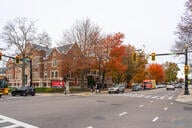You have /5 articles left.
Sign up for a free account or log in.
Is pedigree destiny?
A new study finds that, in political science, earning a Ph.D. from one of a relatively small number of universities is the key to landing a job at a research-intensive university. And the study suggests that the number of academic "superpowers" is so small that good candidates from less-favored institutions are likely being overlooked.
The study looked at the 116 universities ranked by U.S. News & World Report for political science graduate programs, and examined where all of the tenure-track or tenured faculty members earned their doctorates. The top four institutions in the magazine's rankings of departments -- Harvard, Princeton and Stanford Universities and the University of Michigan -- were the Ph.D. alma maters of 616 of the political scientists at the 116 universities (roughly 20 percent of the total). The top 11 institutions were collectively responsible for the doctoral education of about half of those in tenured or tenure-track positions at the 116 universities, leaving more than 100 departments to "contest the remaining 50 percent of openings," says the study.
The study is described in an article by Robert Oprisko, a visiting assistant professor of international studies at Butler University, in The Georgetown Public Policy Review.
Oprisko describes the criticisms others have made of fields in which there are assumptions that a small number of institutions produce the best graduates. He quotes Supreme Court Justice Clarence Thomas, who takes pride that his law clerks are called "third-tier trash" by critics who focus on their law schools' low rankings. Justice Thomas says that they are as smart as the Ivy alumni who dominate other justices' clerk hires.
The issue of whether some departments are too dominant is one that comes up in disciplines besides political science.
Last year, a professor at the University of California at Riverside analyzed the graduate admissions decisions of top graduate programs in philosophy and found that a small number of undergraduate programs produce a disproportionate share of those admitted. An analysis by the American Historical Association in 2008 found that in 1975, 28 percent of full-time faculty members in history earned their Ph.D.s from Ivy League universities. More recently, the figure has dropped to 15 percent.
Do patterns such as those identified in political science matter?
Oprisko said that they do. He said that there is "a circular argument" to consider when asking why some universities are so successful in placement. "Are they being placed because these schools are awesome and they collect the best people, and the best people go there?" Plenty of great people do go to top programs, he said. But they are assisted in part by the great networks that are formed, and their institutional reputations -- not just by their own qualifications. "When an institution hires someone from Harvard or Princeton, they want to say that those are great hires, and that there is prestige because of that, so the incentive is for those numbers to go up."
When considering the undergraduate institutions that send large numbers on to elite graduate programs, he said, you are talking about places that are themselves elite -- places that attract many privileged students. "It's about access. It's about class," he said.
Oprisko said that he isn't suggesting that places such as Harvard shouldn't have good placement records, only that institutions should not rule out those from elsewhere. "There are students graduating from school No. 50 who are no worse than those at school No. 1," he said. It's too easy, he said, to exclude people who didn't earn their Ph.D.s at elite places.
And Oprisko freely admits that the issue is one with which he identifies. He earned a Ph.D. in political theory last year from Purdue University, and he's on the job market because he's in a visiting slot this year.




